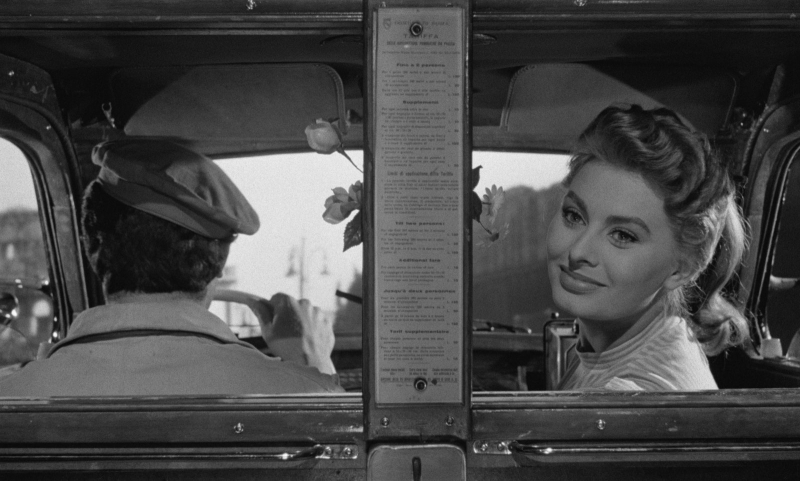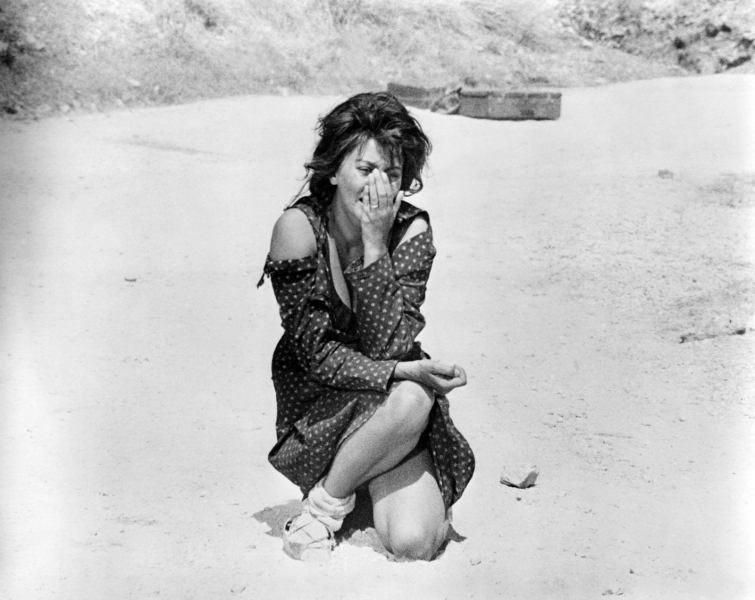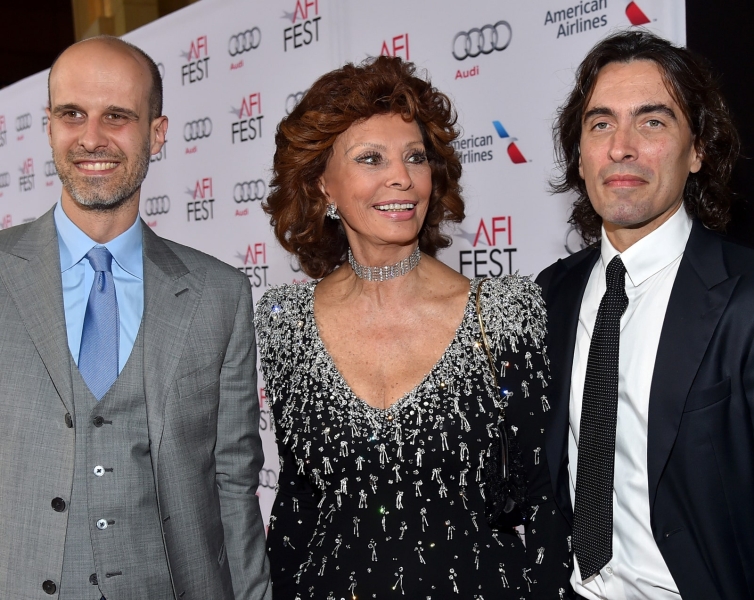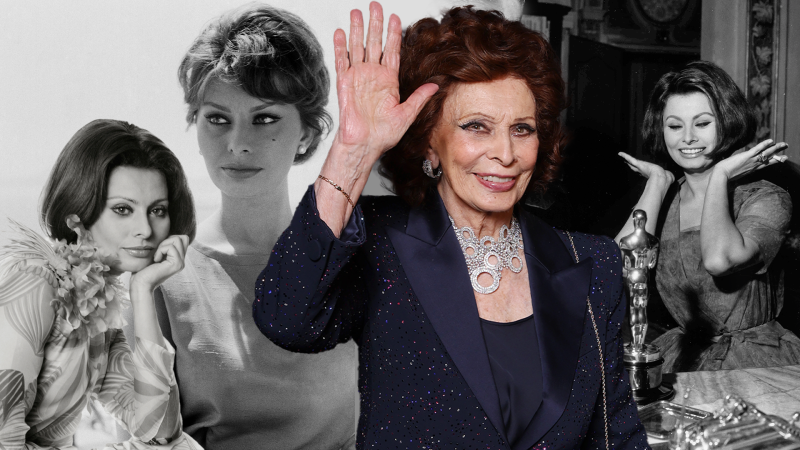“Never more than at the threshold of 90 have I realized that age is a state of mind,” Sophia Loren tells me.
Granting her first interview in years, the Neapolitan icon is in a reflective mood. “I wake up, and it is hard for me to imagine that I’ve been on this earth for almost one century because I still can see a long road ahead of me with so many things to do, places to see, people to meet,” she continues, speaking by phone from Los Angeles. “To be honest, I wish my knees and my back felt the same way because they are the only ones reminding me that I am the age that I am.”
A few months shy of her 90th birthday in September and less than a year after a nasty fall broke her femur, Loren is feeling invigorated; just recently, she made the long trip to Los Angeles from her home in Switzerland to celebrate her granddaughter’s birthday and high school graduation.
It was a journey she insisted upon, her son Edoardo Ponti later tells me. “I don’t know if you saw the pictures of her at Cipriani last week,” he says, proudly. Yes, she was walking with a bedazzled cane—“which she loves, by the way”—but she was out, and she looked fantastic: strong and happy, her russet-color hair perfectly coiffured. “This is a person who is committed to every challenge life sets forth in front of her,” Ponti says. “The fall was just another one.”
This month Loren’s remarkable life and career are the subject of “Sophia Loren: La Signora di Napoli,” a 13-film retrospective at Film at Lincoln Center in New York, cohosted by the Italian film organization Cinecittà. Along with screenings of her most indelible films (including 1960’s Two Women, which made her the first person to win an Oscar for a non-English-language role), the series also boasts gorgeous new 4K restorations of the comedies Arabesque (1966) and Too Bad She’s Bad (1954), the latter marking not only Loren’s first major screen role but also her first of many collaborations with actor Marcello Mastroianni.
“I am not one to dwell on the past,” Loren admits, alluding to the festival. “I tend to focus on today and tomorrow. But sometimes it is important to stop, look over your shoulder, and take stock of what you have left behind up till now. This retrospective allows me to do just that.”

Loren’s stunning filmography is a waltz through Hollywood history itself, her films running the gamut from amusing romantic comedies, like 1963’s Yesterday, Today and Tomorrow (which features her iconic striptease), to solemnly serious dramas like A Special Day 1977). Centered on the brutal rise of Italian fascism, that film, by Ettore Scola, mimicked Loren’s own reality decades earlier, as she and her family found themselves starving and huddling in train tunnels around Naples to escape the bombing during World War II.
“Each film has been a unique adventure,” Loren says. “They’re all chapters of my life where lessons were learned, tears were shed, and challenges were overcome.” Ponti—whose late father, producer Carlo Ponti, oversaw many of Loren’s greatest screen triumphs, including the aforementioned Two Women—has found revisiting those films just as emotional. “With each role she gave herself completely to that process. I’m not saying this because she’s my mother,” he insists, “but truly and objectively, she has no equal.”

This is a woman, after all, who got her start as a model for fotoromanzi—Italian soap-opera comics popular before the proliferation of television—and has remained a relevant cultural force well into the streaming era. (Ponti directed Loren in the 2020 Netflix film The Life Ahead to acclaim.) “You don’t know how many letters a week she receives from fans of all generations, but mostly really young people,” Ponti says. “What’s exceptional about my mother is that she has created worthy work for every decade of her life, and she has touched every generation along the way.”
Burnishing her screen persona during Italy’s postwar boom, Loren helped to export the glamour of Italian culture throughout the rest of the world, her films serving for Italian immigrants in America as a link to the old country—and her native Naples, in particular. That idea was perhaps no better exemplified than in her famed performance of “Tu Vuo Fa L’Americano” from the 1960 comedy classic It Started in Naples.
Of course, Loren’s stunning beauty was another facet of her legend, making her one of the world’s utmost sex symbols. After her first Vogue US cover in 1961, she went on to be shot for the magazine by the likes of Richard Avedon and Bert Stern. (In 1994, Loren would reconcile her film and fashion bona fides in Robert Altman’s Prêt-à-Porter, a satirical comedy set during Paris Fashion Week.)
“One of my fondest memories is from a [Vogue] shoot,” Loren recalls. “Lord Snowdon, the photographer, went to my house [the sprawling Villa Ponti] to take a picture of me and my son Carlo. The idea was hatched that we were going to pose in a big Roman tub.” If only it were that simple. “There was water in there, and we were freezing. I remember very clearly how my son, at three years old, absolutely hated the idea. It took us a while for him to come around, but we both tried to make him laugh, and what started out as something uphill turned out to be a wonderful memory.”
“The spotlight and this kind of work is so alluring that for many actors, it comes before their family, even though they pretend it doesn’t,” says Edoardo. “But in my mother’s case, it truly does not. Her biggest desire in life was to have a family, so we never felt second to anything. It helped center us and give us the confidence nowadays to overcome our own obstacles. Love is great armor.”
Hence the recent trip to LA to be with her loved ones while she recovered from that fall last September, after which Loren underwent emergency surgery for multiple fractures. “I knew that if I wanted to continue the life that I had before the fall, I had to do all the physical work to be able to walk again,” she explains. “So, basically since autumn, I’ve been seeing a physiotherapist five days a week.” Adds Ponti: “How many people close to 90 can travel half the world for a few weeks to be there for their family? It’s amazing.”

With that drive in mind, I ask Ponti if audiences can expect to one day see Loren grace the screen again. “She 100% wants to keep on working, and we’re actively looking for the next project,” he says. “We need to choose it very carefully because we don’t want the next one to be a minor work. We need to make sure the next thing is even more fulfilling for her creatively and also for the audience. It takes time to evaluate the different scripts that are being offered and the characters she wants to play. So it’s a process.”
In the meantime, as her 90th birthday approaches, Loren is basking in the glow of a shining legacy, with the festival serving as a sweet reminder of just how far the pride and joy of Naples has come: “To be able to share these moments of my life with everybody touches me deeply.”
“Sophia Loren: La Signora di Napoli” is at Film at Lincoln Center from June 7 to 13.

